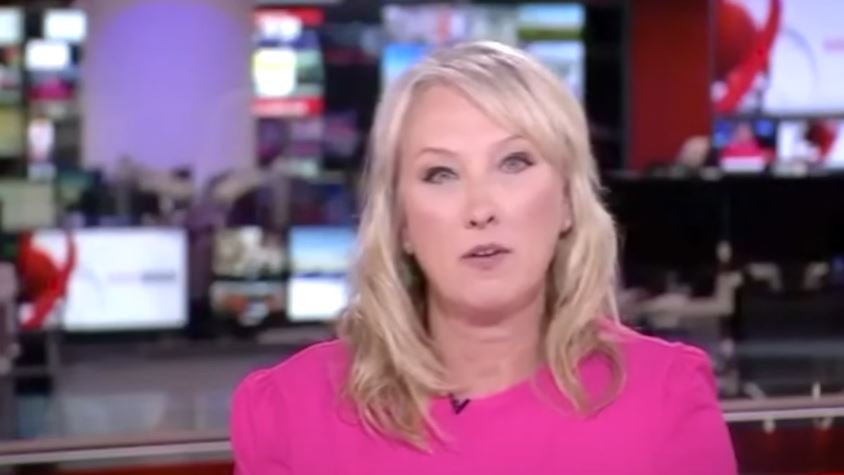
Martine Croxall made a brief but emotionally impactful change during a quiet Saturday news segment, and it has since spread throughout digital, cultural, and political spheres. During a live BBC broadcast, she read a passage from a public health study, paused a little, and substituted the word “women” for “pregnant people,” before continuing with the report. Even though it was brief, the effects have been felt well beyond the studio.
The correction has been analyzed with remarkable vigor in recent days. J.K. Rowling immediately praised Croxall’s choice of words, referring to her as a “new favourite” and suggesting that the correction supported biological definitions in a time when gender discourse was changing. It was a very obvious act of bravery for supporters. It caused critics to worry about being left out. What might have been considered a routine on-air slip instead sparked a fresh discussion about how language affects identity.
BBC Presenter Martine Croxall – Broadcast Moment and Career Summary
| Name | Martine Croxall |
|---|---|
| Occupation | BBC News Presenter |
| Employer | British Broadcasting Corporation (BBC) |
| Notable Event | Changed “pregnant people” to “women” on air |
| Date of Incident | June 2025 |
| Phrase Source | Dr. Malcolm Mistry, Public Health Researcher |
| Public Reaction | Divided—strong support and sharp criticism |
| Institutional Response | BBC backed her, no disciplinary action |
| Legal Context | UK Supreme Court: “woman” based on biology |
| Media Involvement | Covered by Deadline, Fox, PinkNews |
The quote was first used by Dr. Malcolm Mistry of the London School of Hygiene & Tropical Medicine, who emphasized the vulnerabilities of “pregnant people” in a recent study on heat-related mortality. It was a term with a scientific framework that was intended to recognize the health requirements of everyone who could become pregnant, including transgender and non-binary people. However, Croxall’s choice to use the word “women” instead struck a different chord, one that is firmly anchored in media ethics, personal identities, and legal definitions.
Croxall brought attention to the growing nexus between scripted journalism and individual conscience by making the corrections in real time. Even though it was subtle, her change had a particularly strong effect, especially when combined with the subsequent slight eye-roll. This moment seemed to some viewers like a return to common sense. Others perceived it as a purposeful evasion of inclusivity.
By Monday morning, a composed and thoughtful statement had been released by the BBC. They made it clear that the text Croxall read was not internal editorial copy, but rather was taken directly from a quote. They clarified that using the terms “pregnant people” or “pregnant women” is neither required nor prohibited by the BBC’s style guide. The broadcaster successfully shielded Croxall while separating itself from the contentious online discussion by allowing for discretion.
Interestingly, the BBC’s internal tone remained positive. According to staff insiders, leadership was “intensely relaxed” about the incident, which is a big change from past instances where internal review was triggered by on-air remarks about sex and gender. This noticeably greater acceptance of diverse expression signals a move away from strict adherence and toward editorial nuance, which may be a calculated move.
News segments are usually planned to steer clear of controversy through strategic collaborations between presenters, producers, and communications personnel. However, spontaneity still eludes live television, especially when it comes to sensitive information or health stories. Whether intentional or intuitive, Croxall’s small change demonstrated how a person’s convictions can subtly reappear during even the most procedural of scripts.
This moment is especially complicated because of the legal context. The Supreme Court of the United Kingdom reaffirmed in April 2025 that biological sex is the basis for the legal definition of a woman. Despite its technicality, that choice had a big cultural impact. It gave many people the impression that using “women” in situations like pregnancy was acceptable. Others saw it as a sign that trans identities were becoming less accepted. Whether on purpose or not, Croxall’s wording followed that court’s ruling.
Similar language queries, such as “chestfeeding” and “birthing parent,” generated intense debates on public health websites and media outlets during the pandemic. Although those terms are meant to be inclusive, they have also caused audiences to grow weary of hearing terms that seem too clinical or foreign. Croxall tapped into that sentiment in a way that was immediately recognizable and emotionally charged by changing the phrase “pregnant people” to “women.”
She was remarkably modest in her composed post-broadcast tweet, thanking new followers and acknowledging the intense attention. She didn’t apologize, she didn’t double down. In a media environment that is frequently dominated by retractions, explanations, and apologies, the lack of defensiveness was surprisingly refreshing. She avoided the political minefield and maintained her integrity by remaining calm.
Curiously, this instance was not unique. It is part of a broader media trend in which journalists and anchors are quietly forced to choose between public opinion and institutional policy. BBC presenters such as Justin Webb have faced criticism in the past for using gendered language that deviated from the official tone. However, Croxall’s experience seems to have transpired with a great deal less institutional pressure.
The Croxall episode could be used as a model for broadcasters in their early stages of reputation-building. It serves as an example of how minor linguistic decisions can spark more extensive discussions. It also demonstrates how discretion combined with resilience can be especially useful in containing media outrage while upholding one’s morals.
Language wasn’t the only thing Croxall had to adjust to. It had to do with delivery, context, and timing. She didn’t editorialize, campaign, or grandstand. As many believed, she spoke simply and with intuitive clarity. By doing this, she placed herself in the company of journalists who are becoming more and more respected for their genuineness rather than their objectivity.
